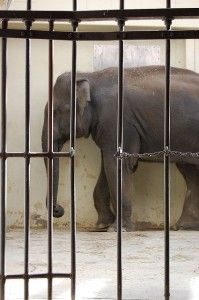Elephant Incarceration: New York State’s Shame

Recently, the national animal advocacy organization In Defense of Animals conducted its annual evaluation of the worst zoos (in terms of humane elephant care) in America: its “top ten” list, to New York’s shame, includes three zoos in this roster — no other state cited has more than one. The three zoos are the Bronx Zoo, the Buffalo Zoo, and the Rosamond Gifford Zoo in Syracuse.
Keeping elephants in captivity has long been a bitterly contested practice. Elephants are a highly intelligent, long-lived, and social species: to ignore their psychological and social needs creates depression, illness and psychosis, while incarceration in small enclosures on hard surfaces in our bitterly cold winters promotes physical illness. When kept alone, they suffer from extreme loneliness. Physically, they are prone to severe lameness, foot injuries, arthritis, tuberculosis, and shorter life spans than those in the wild. Obviously, they cannot live as they have evolved for millennia to live in tightly bonded matriarchal groups who stay together for life. Each new baby is cared for by a host of doting female relatives — sisters, cousins, and aunts — in addition to his or her mother. They wander hundreds of miles in a year, following the seasonal water and food supplies and led by the old experienced members. When an aged male or female elephant dies (whether naturally or by slaughter,) their kin return to the skeleton year after year to touch and caress it. Incarceration makes all of these activities and behaviors impossible.
Those scientists who defend keeping elephants in zoos — like Ringling Brothers’ excuses for their circus elephant breeding programs — claim that they are trying to promote conservation and the preservation of the species, but this is disingenuous and plain bad science. As elephants continue to be slaughtered in the wild by poachers eager to profit from illegal ivory sales — over 100 daily, by some estimates — the millions of dollars spent by zoos to keep their elephants in inadequate facilities would do far better to conserve elephants if the funds were used instead to protect them in their natural habitats. Establishing larger preserves, increasing the numbers of anti-poaching personnel, and promoting tourism to witness the elephant herds from a distance, making them more valuable alive than dead, would do far more to keep these magnificent beings a part of the rich diversity of live on earth throughout the 21st century.
Please note that last year’s passage of the bill to ban ivory sales in New York, signed into law by Governor Cuomo in August 2014, was an important measure to protect elephants — thanks to all of you who called your legislators to support this crucial legislation.
Please call or write these zoos to politely request that they do the right thing by releasing their elephants to a suitable sanctuary. NYSHA thanks you!
- Bronx Zoo
Wildlife Conservation Society
2300 Southern Blvd.
Bronx, NY 10460
718-220-5100 - Buffalo Zoo
300 Parkside Ave.
Buffalo, NY 14214-1999
716-837-3900 - Rosamond Gifford Zoo
Burnett Park
One Conservation Place
Syracuse, NY 13204
315-435-8511
New York State Humane Association Humane Review, Vol. XXVIII No. 2, Fall 2014/Winter 2014-2015.